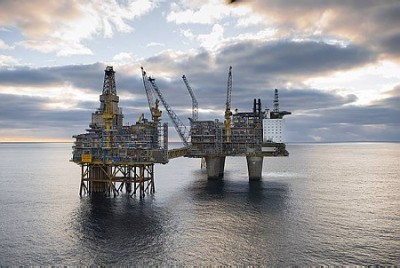Norway’s oil and gas production faced shutdown this week, if oil industry officials went through with their threat to lock out all workers from all oil rigs on the Norwegian continental shelf from midnight Monday. New negotiations over the weekend failed to resolve a conflict over rights to early retirement.

(See latest developments in the oil industry conflict here.)
A lock-out, rarely imposed in labour conflicts in Norway, is generally viewed as a last-ditch response by business and industry to lengthy strikes where no settlement is in sight. If striking workers won’t return to work, they reason, then the employers won’t allow anyone to work, including those who are not directly involved in the dispute. That puts huge pressure on the striking unions.
In this case, the oil industry employers’ organization OLF (Oljeindustriens Landsforening) representing Statoil and other oil companies with stakes in the rigs is hoping the government will step in and force a settlement. Most of the 708 rig employees who walked off the job June 24, angry that they faced the loss of earlier-negotiated rights to full retirement benefits from age 62, work for Statoil, which claims it was merely following government-initiated pension reforms aimed at keeping Norwegians on the job until reaching the official retirement age of 67.
OLF resorted to the lock-out threat late last week, but failed to secure any immediate backing from the government other than a directive from Labour Minister Hanne Bjurstrøm that they head back to the bargaining table. A state mediator called in the parties involved (OLF and three labour organizations) and negotiations resumed, but broke down again Sunday morning.
The government, meanwhile, is led by the Labour Party and thus extremely reluctant to order what’s called tvungen lønnsnemnd (compulsory arbitration) for political reasons. Bjurstrøm, who hails from the Labour Party herself, was under strong pressure from Norway’s trade union confederation LO and other labour organizations to stay out of the conflict and let the two sides resolve their own dispute.
Enormous oil and gas revenues to the state treasury are at stake, however, as is Norway’s international reputation as a solid and stable oil and gas provider. With the dispute occurring in the middle of summer, there would be no immediate crisis if energy supplies to the Europe were interrupted, but problems would arise eventually.
Jan Hodneland, chief negotiator for OLF, called the situation “extremely serious” but OLF officials continue to claim that they can’t offer pension benefits that are so much better than what the government itself has directed. Statoil remains majority-owned by the Norwegian government and its executives contend they merely have been loyal to the government pension reforms.
The workers, however, point to many of the executives’ own lucrative pension plans and scoff at concerns over the expense of early retirement. Most agree that the oil industry has the financial muscle to absorb rising personnel costs, and OLF already has gone along with higher pay raises and other benefits than those granted other workers in Norway.
The workers would surely lose their early retirement demands if Bjurstrøm does end up ordering them back to work under compulsory arbitration, because the pension issue is considered one of principle, and thus not handled by arbitrators. They would leave it up to individual companies to deal with.
As the strike entered its 15th day on Monday, Bjurstrøm had to wrestle with whether the strike caused enough damage to the state’s social and economic interests to justify ending it, at a time when her party already has been under criticism over a rash of strikes earlier this spring.
Views and News from Norway/Nina Berglund
Please support our news service. Readers in Norway can use our donor account. Our international readers can click on our “Donate” button:

